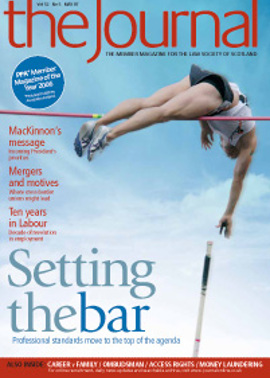Book reviews

Andrew M Hajducki QC
PUBLISHER: AVIZANDUM
ISBN: 1 904 96800 9
PRICE: £65
For generations lawyers have been fascinated and somewhat mystified by juries and how they work. Recent research in New South Wales reported that a significant proportion of jurors, interviewed immediately after they had delivered their verdicts, were confused and uncertain about the decisions just reached. But the institution has always had its distinguished supporters. Lord President Cooper once remarked that the occasional civil jury trial introduced “a light relief into the weary existence of the practitioner and on that account enjoys a measure of popularity in Parliament House” (Selected Papers (1956), 70).
As Andrew Hajducki QC explains in the second edition of this excellent book, the popularity of civil juries in the Court of Session has waxed and waned over time. In 1815 the Jury Trials (Scotland) Act created, for an experimental period of seven years only, a separate Jury Court in Scotland, independent of the Court of Session. The institution took root and, as Mr Hajducki sets out in an interesting account of its history, it survived examination by a series of Royal (and other) Commissions in the 19th and 20th centuries. The 1950s and 1960s were, Mr Hajducki suggests, perhaps their golden age and there followed a slow and seemingly inexorable decline. In 1982 (for the first year since 1816, excluding wartime) not a single jury trial took place in the Court of Session. A consultation paper from Scottish Courts Administration in 1988 asked whether the coup de grace should be administered, but the response was largely in favour of retention and the Court of Session Act 1988 preserved the statutory basis.
Then in the 1990s civil juries started to regain some measure of popularity. Practitioners perhaps began to appreciate again the potential for generous awards of damages by juries in certain types of cases; and the view that a weak case might be better brought before a jury than a judge attracted some support. The old authorities on “special cause” for withholding a case from a jury had to be dusted down. There was also an increasing tendency for jury awards to be reported. More publicity ensued with a defamation action involving a priest, the inevitable (unsuccessful) challenge to the institution under the European Convention on Human Rights, and some surprisingly low awards. All of these fluctuations in the fortunes of the civil jury trial are carefully charted by Mr Hajducki in his introductory section.
What Mr Hajducki could not have anticipated, however, since he has sought to state the law and relevant practice at March 2006, was the intense glare of publicity that would beam down on a civil jury trial fought out over several weeks of that summer between Tommy Sheridan MSP and the News of the World. With every seat taken (and long queues outside), the tension and excitement shattered the tranquillity of the summer vacation in Parliament House as one dramatic day followed another. This crackling cocktail of sex and politics was somewhat more high octane than the “light relief” mentioned by Lord Cooper. The drama may not be over yet as the newspaper has enrolled a motion for a new trial.
The new edition of this book is extremely comprehensive and sets out admirably everything that the practitioner needs to know about the law and practice governing the conduct of a case that goes to a jury trial in the Court of Session. But the book is far more than a dry exposition of the law; for a legal textbook it is unusually interesting and entertaining. In addition to providing a historical context, the author surveys experience in other countries, puts forward arguments for and against jury trials and includes advice about advocacy and many other practical tips. There are styles for issues and notes of exceptions and an example of an opening speech for the pursuer. An appendix records recent jury awards. There are even two lines of verse on the Jury Court quoted from a 19th century contributor.
To cap it all, Mr Hajducki has established a free open-access online noter-up, and invites readers to contribute or comment on any new developments affecting his subject (see www.civiljurytrials.com).
The whole thing is, in the opinion of this reviewer, a tour de force. It will be of interest not just to Court of Session practitioners, but to anyone with an interest in the history of Scots law.
Paul Cullen QC
In this issue
- Block fees: the story behind the changes
- Strategic advance
- Court plans with little appeal
- Under commission
- Two into one can go
- Ten years of labour
- Career v Family
- Monitor - at your own risk
- Raising the standard
- Society shapes the changes
- Society shapes the changes (1)
- Money laundering to change again
- Border and Immigration Agency launches
- Dealing positively with client concerns
- From the Brussels office
- Winning ways
- Toothless against spam?
- Risk reinvented
- Technical but essential
- Pension sharing tips on divorce
- In pursuit of simplicity
- In pursuit of simplicity (1)
- First in the class
- Scottish Solicitors' Discipline Tribunal
- Website reviews
- Book reviews
- On the road
- Access or excess?
- Alterations are no 2 problem
- ARTL: upgrade now for security






